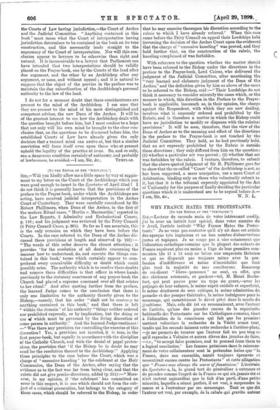[TO THE EDITOR OF THE "SPECTATOR."] you kindly allow me
a little space by way of supple- ment to my letter on the Court of the Archbishops which you were good enough to insert in the Spectator of April 22nd1 I do not think it is generally known that the provisions of the preface to the Prayer-book, under which the Archbishops are acting, have received judicial interpretation in the Arches Court of Canterbury. They were carefully considered by Sir Robert Phillimore, when Dean of the Arches, in the first of the modern Ritual cases, "Martin v. Maconochie," reported in the Law Reports, 2 Admiralty and Ecclesiastical Courts, p. 116; and his judgment was reviewed by the Privy Council (2 Privy Council Cases, p.365). So far as I can ascertain, this is the only occasion on which they have been before the Courts. In the case referred to, the Dean of the Arches dis- cussed these provisions at length and observed (p. 192) :— " The words of this order deserve the closest attention ; it provides 'for the resolution of all doubts concerning the manner how to understand, do, and execute the things con- tained in this book,' terms which certainly appear to com- prehend every conceivable difficulty or doubt which could possibly arise. The authority which is to resolve these doubts and remove these difficulties is that officer in whose hands previously to the statutory enactment of any prayer-book the Church had placed a supreme command over all that relates to her ritual." And after quoting further from the preface, the learned Judge comes to the conclusion that there is only one limitation to the authority thereby given to the Bishop,—namely, that his order "shall not be contrary to anything contained in this book," and that there is left within the domain" of his authority "things neither ordered nor prohibited expressly, or by implication, but the doing or use of which must be governed by the living discretion of some person in authority." And the learned Judge'continnes : —" Was there any provision for controlling the exercise of this discretion? Yes, a provision not inserted, it is true, in the first prayer-book, but equally in accordance with the discipline of the Catholic Church, and with the denial of papal preten- sions, the provision that 'if the Bishop be in doubt he may send for the resolution thereof to the Archbishop." Applying these principles to the case before the Court, which was a charge of "excessive kneeling" by the celebrant at the Holy Communion, the Dean of the Arches, after saying that the evidence as to the fact was far from being clear, and that the rubric did not give precise directions, added (p. 211) :—" More- over, in my opinion, if 'the celebrant' has committed an error in this respect, it is one which should not form the sub- ject of a criminal prosecution, but belongs to the category of those cases, which should be referred to the Bishop, in order that he may exercise thereupon his discretion according to the rubric to which I have already referred." When this case came before the Privy Council on appeal their Lordships held (reversing the decision of the Arches Court upon the evidence) that the charge of "excessive kneeling" was proved, and they held further that, on the construction of the rubric, the kneeling complained of was forbidden.
With reference to the question whether the matter should have been referred to the Bishop under the directions in the preface to the Prayer-book, Lord Cairns, who delivered the judgment of the Judicial Committee, after mentioning the "very learned and elaborate judgment of the Dean of the Arches," and the definition given by him as above of the cases to be referred to the Bishop, said :—" Their Lordships do not think it necessary to consider minutely the cases which, or the manner in which, this direction in the Preface to the Prayer- book is applicable, inasmuch as, in their opinion, the charge against the Respondent, with which they are now dealing, involves what is expressly ordered and prohibited by the Rubric, and is therefore a matter in which the Bishop could have no jurisdiction to modify or dispense with the rubrical provisions." It will be seen, therefore, that the view of the Dean of Arches as to the meaning and effect of the directions in the, preface to the Prayer-book is not touched by the Judicial Committee. They held, as he had previously held, that an act expressly prohibited by the Rubric is outside. those directions ; they only differed from him on the questions (1) whether a particular act was proved ; (2) whether that act was forbidden by the rubric. -I venture, therefore, to submit that the above-quoted judgment of Sir R. Phillimore goes far to show that the so-called " Court " of the Archbishop is not, as has been suggested, a mere usurpation, nor a mere Court of Arbitration, binding only on those who voluntarily submit to it, but that it is the tribunal expressly appointed by the Act of Uniformity for the purpose of finally deciding the particular questions which it is understood are to be argued before it.—






















































 Previous page
Previous page